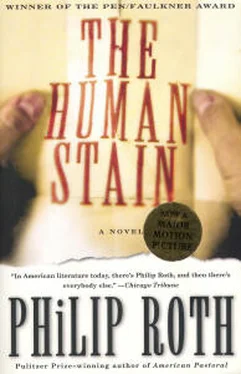Whereas the older types, who are uncool and tweedy, “The Humanists”... Well, obliging as she must be at conferences and in publications to write and speak as the profession requires, the humanist is the very part of her own self that she sometimes feels herself betraying, and so she is attracted to them: because they are what they are and always have been and because she knows they think of her as a traitor. Her classes have a following, but they think of that following contemptuously, as a fashionable phenomenon. These older men, The Humanists, the old-fashioned traditionalist humanists who have read everything, the born-again teachers (as she thinks of them), make her sometimes feel shallow. Her following they laugh at and her scholarship they despise. At faculty meetings they're not afraid to say what they say, and you would think they should be; in class they're not afraid to say what they feel, and, again, you would think they should be; and, as a result, in front of them she crumbles. Since she doesn't herself have that much conviction about all the so-called discourse she picked up in Paris and New Haven, inwardly she crumbles. Only she needs that language to succeed. On her own in America, she needs so much to succeed! And yet everything that it takes to succeed is somehow compromising, and it makes her feel less and less genuine, and dramatizing her predicament as a “Faustian bargain” helps only a little.
At moments she even feels herself betraying Milan Kundera, and so, silently, when she is alone, she will picture him in her mind's eye and speak to him and ask his forgiveness. Kundera's intention in his lectures was to free the intelligence from the French sophistication, to talk about the novel as having something to do with human beings and the comédie humaine; his intention was to free his students from the tempting traps of structuralism and formalism and the obsession with modernity, to purge them of the French theory that they had been fed, and listening to him had been an enormous relief, for despite her publications and a growing scholarly reputation, it was always difficult for her to deal with literature through literary theory. There could be such a gigantic gap between what she liked and what she was supposed to admire — between how she was supposed to speak about what she was supposed to admire and how she spoke to herself about the writers she treasured — that her sense of betraying Kundera, though not the most serious problem in her life, would become at times like the shame of betraying a kindly, trusting, absent lover.
The only man she's been out with frequently is, oddly enough, the most conservative person on campus, a divorced man of sixty-five, Arthur Sussman, the Boston University economist who was to have been secretary of the treasury in the second Ford administration. He is a bit stout, a bit stiff, always wearing a suit; he hates affirmative action, he hates Clinton, he comes in from Boston once a week, is paid a fortune, and is thought to make the place, to put little Athena on the academic map. The women in particular are sure she has slept with him, just because he was once powerful. They see them occasionally having lunch together in the cafeteria. He comes to the cafeteria and he looks so excruciatingly bored, until he sees Delphine, and when he asks if he may join her, she says, “How generous of you to endow us with your presence today,” or something along those lines. He likes that she mocks him, to a point. Over lunch, they have what Delphine calls “a real conversation.” With a thirty-nine-billion-dollar budget surplus, he tells her, the government is giving nothing back to the taxpayer. The people earned it and they should spend it, and they shouldn't have bureaucrats deciding what to do with their money. Over lunch, he explains in detail why Social Security should be given over to private investment analysts. Everybody should invest in their own future, he tells her. Why should anyone trust the government to provide for people's futures when Social Security has been giving you x returns while anybody who had invested in the stock market over the same period of time would now have twice as much, if not more? The backbone of his argument is always personal sovereignty, personal freedom, and what he never understands, Delphine dares to tell the treasury-secretary-who-never-was, is that for most people there isn't enough money to make choices and there isn't enough education to make educated guesses — there isn't enough mastery of the market. His model, as she interprets it for him, is based on a notion of radical personal liberty that, in his thinking, is reduced to a radical sovereignty in the market. The surplus and Social Security — those are the two issues that are bugging him, and they talk about them all the time. He seems to hate Clinton most for proposing the Democratic version of everything he wanted. “Good thing,” he tells her, “that little squirt Bob Reich is out of there. He'd have Clinton spending billions of dollars retraining people for jobs they could never occupy. Good thing he left the cabinet. At least they have Bob Rubin there, at least they have one sane guy who knows where the bodies are buried. At least he and Alan kept the interest rates where they had to be. At least he and Alan kept this recovery going...”
The one thing she likes about him is that, aside from his gruff insider's take on economic issues, he happens also to know all of Engels and Marx really well. More impressive, he knows intimately their The German Ideology, a text she has always found fascinating and loves. When he takes her out to dinner down in Great Barrington, things turn both more romantic and more intellectual than they do at lunch in the cafeteria. Over dinner he likes to speak French with her. One of his conquests years ago was Parisian, and he goes on endlessly about this woman. Delphine does not, however, open her mouth like a fish when he talks about his Parisian affair or about his manifold sentimental attachments before and after. About women he brags constantly, in a very suave way that she doesn't, after a while, find suave at all. She cannot stand the fact that he thinks she's impressed by all his conquests, but she puts up with it, only slightly bored, because otherwise she's glad to be having dinner with an intelligent, assertive, well-read man of the world. When at dinner he takes her hand, she says something to let him know, however subtly, that if he thinks he is going to sleep with her, he is crazy. Sometimes in the parking lot, he pulls her to him by cupping her behind and holding her against him. He says, “I cannot be with you time after time like this without some passion. I can't take out a woman as beautiful as you, talk to her and talk to her and talk to her, and have it end there.” “We have a saying in France,” she tells him, “which is...” “Which is what?” he asks, thinking he may pick up a new bon mot in the bargain. Smiling, she says, “I don't know. It'll come to me later,” and in this way gently disentangles herself from his surprisingly strong arms. She is gentle with him because it works, and she is gentle with him because she knows he thinks it is a question of age, when in fact it is a question, as she explains to him driving back in his car, of nothing so banal: it is a question of “a frame of mind.” “It's about who I am,” she tells him, and, if nothing else has done it, that sends him away for two or three months, until he next turns up in the cafeteria, looking to see if she is there. Sometimes he telephones her late at night or in the early hours of the morning. From his Back Bay bed, he wants to talk with her about sex. She says she prefers to talk about Marx, and it takes no more, with this conservative economist, to put a stop to that stuff. And yet the women who don't like her are all sure that because he's powerful she has slept with him. It is incomprehensible to them that, bleak and lonely as her life is, she has no interest in becoming Arthur Sussman's little badge of a mistress. It has also gotten back to her that one of them has called her “so passé, such a parody of Simone de Beauvoir.” By which she means that it is her judgment that Beauvoir sold out to Sartre — a very intelligent woman but in the end his slave. For these women, who observe her at lunch with Arthur Sussman and get it all wrong, everything is an issue, everything is an ideological stance, everything is a betrayal — everything's a selling out. Beauvoir sold out, Delphine sold out, et cetera, et cetera. Something about Delphine makes them go green in the face.
Читать дальше












